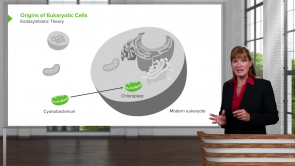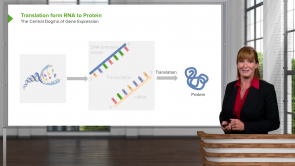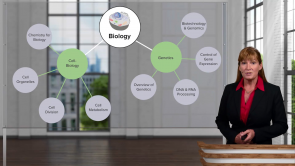Post-transcriptional Modification: Splicing

About the Lecture
The lecture Post-transcriptional Modification: Splicing by Georgina Cornwall, PhD is from the course Gene Expression.
Included Quiz Questions
You are characterizing a novel protein in mice. Analysis shows that high levels of the primary transcript coding for this protein are found in the brain, muscle, liver, and pancreatic tissues. However, an antibody that recognizes the C-terminal portion of the protein indicates that the protein is present in the brain, muscle, and liver, but not in the pancreas. What is the most likely explanation for this result?
- Alternative splicing in the pancreas yields a protein that is missing the portion that the antibody recognizes.
- The gene that codes for this protein is not transcribed in the pancreas.
- There is no modification of the primary transcript in the pancreas.
- Alternative splicing in the brain, muscles, and liver decreases the level of translation.
- Introns of the primary transcript were spliced together instead of the exons in the pancreatic tissues.
Which of the following is CORRECT regarding spliceosomes? Select all that apply.
- Spliceosomes act like molecular scissors to cut the introns from the pre-mRNA transcript to generate mature mRNA.
- Spliceosomes are composed of snRNPs.
- Spliceosomes add a 5' cap and poly-A tail to pre-mRNA.
- Spliceosomes help in the transfer of mRNA from the transcription bubble to the exterior of the nucleus.
- Spliceosomes excise exons from tRNA and join introns together to generate a fully functional tRNA molecule.
Which of the following is best explained by alternative splicing?
- The genetic diversity in eukaryotes
- The genetic similarity between eukaryotes and prokaryotes
- The genetic similarity among eukaryotes
- The genetic similarity among prokaryotes, eukaryotes, and viruses
- The genetic similarity among prokaryotes
These courses may be of interest to you
Customer reviews
5,0 of 5 stars
| 5 Stars |
|
5 |
| 4 Stars |
|
0 |
| 3 Stars |
|
0 |
| 2 Stars |
|
0 |
| 1 Star |
|
0 |









